Secret Weddings in Game of Thrones: Power and Intrigue
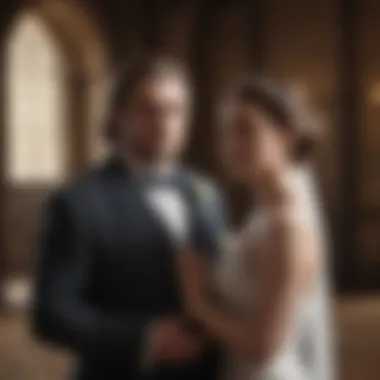
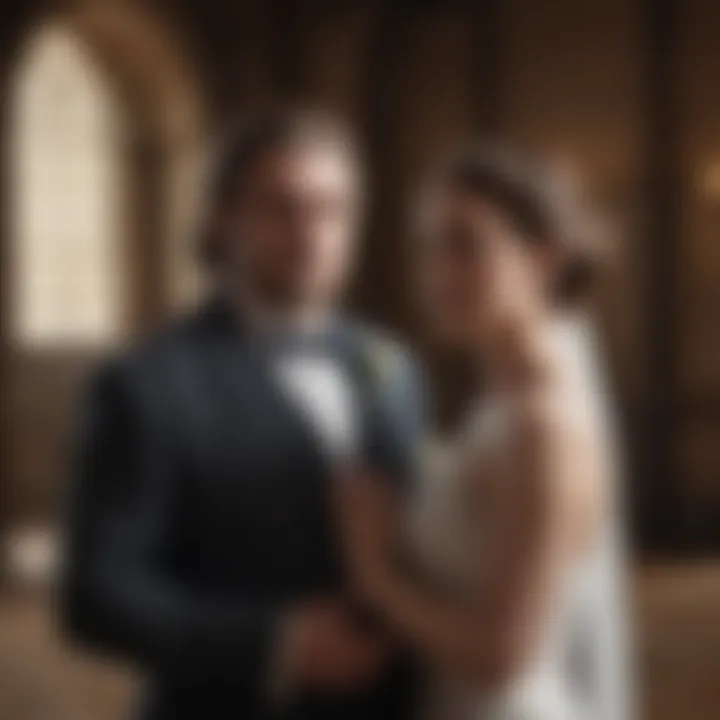
Intro
The narrative of Game of Thrones intricately weaves itself around the idea of secrecy, particularly in regard to weddings. These clandestine unions play a pivotal role in shaping character arcs, influencing power dynamics, and highlighting societal norms within the brutal world of Westeros. Secret weddings often emerge from desperation, ambition, or necessity, to navigate the treacherous waters of political intrigue. In this exploration, we will dissect key characters, significant events, and the rich lore surrounding these hidden ceremonies, providing a comprehensive understanding of their impact on the overall story.
Character Dissections
Key Characters and Their Motivations
In Game of Thrones, secret weddings often reflect the characters’ desires and their calculated moves. Characters such as Robb Stark and Jeyne Westerling embody this theme. Robb's impulsive union, driven by love and loyalty, starkly contrasts with the calculated decisions of Tyrion Lannister and Sansa Stark.
- Robb Stark: His marriage to Jeyne signifies a personal rebellion against the political machinations of his mother and the Freys. This decision ultimately leads to dire consequences, underlining the peril of prioritizing personal desire over duty.
- Tyrion Lannister: His marriage to Sansa is not based on love, but on strategy. Tyrion’s intentions and the complex emotions that come with marrying under duress reveal the power struggles prevalent in this world.
Character Development Throughout the Series
As the series progresses, these secret unions serve as crucial turning points for the characters involved. They catalyze transformations, forcing them to confront their values and allegiances.
- Robb Stark's tragic fate illustrates how personal choices can lead to broader disaster, emphasizing the theme of sacrifice inherent in leadership.
- Sansa Stark develops resilience through her forced marriage, eventually leveraging her experiences to navigate her fate within the convoluted political landscape.
Impact on the Overarching Storyline
Secret weddings are not merely plot devices; they serve to advance the overarching narrative. Each union has consequences that resonate throughout the storyline, influencing alliances and trajectories of war.
"Every act of love or hate is intricately tied to the outcomes of battles. The blending of personal and political underscores the very essence of Westeros."
Episode Breakdowns
A close examination of specific episodes showcases how secret weddings underscore larger themes.
Significant Events Recap
Episodes like "The Rains of Castamere" illustrate the catastrophic fallout of hidden unions. Robb Stark's secret marriage sets off a chain reaction of betrayal, culminating in one of the series' most pivotal moments: the Red Wedding.
Themes and Symbolism
The symbolism surrounding weddings often contrasts hope and despair. Celebratory rites reveal underlying tensions and foreshadow betrayals.
Key Moments and Their Implications
These hidden unions, marked by secrecy and deception, remind viewers that personal desires often clash with harsh political realities. Each wedding carries weight, shaping character arcs and altering the course of events in profound ways.
Lore Explorations
The lore of Westeros adds depth to the understanding of secret weddings. Historical precedents demonstrate how such unions were often crafted to secure power or manipulate allegiances.
Rich History and Connections
Weddings have always been political tools in history. In Game of Thrones, marriages often reflect the strategic calculations of families like the Lannisters and the Baratheons. The Dance of Dragons, a civil war rooted in royal lineage and succession disputes, serves as a notable example.
Cultural Aspects
Culturally, weddings in Westeros reveal societal norms that prioritize lineage and power over personal choice. This historical context illuminates how characters grapple with expectations and their personal desires, leading them to seek clandestine unions.
Uncovering Hidden Details
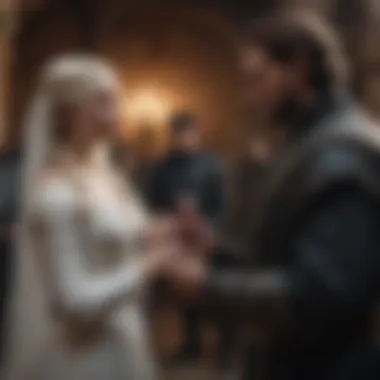
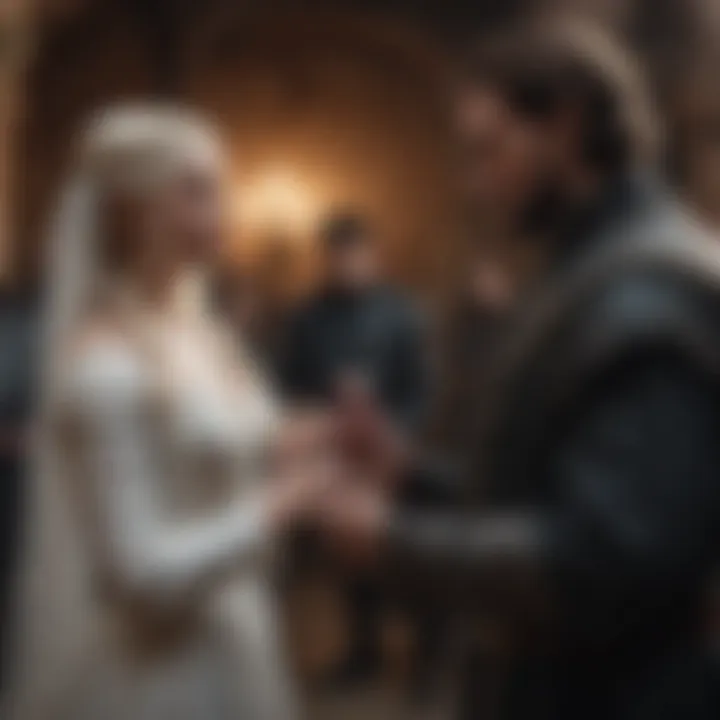
Delving into the show's narrative, viewers can uncover subtle connections and foreshadowing elements that signal the significance of these secret unions. Watching closely allows fans to appreciate the intricate web of relationships and political maneuvers.
Fan Theories
The Game of Thrones fandom has speculated about the implications of secret weddings and their future in the story.
Compilation of Theories
Popular theories revolve around potential unions and their impact on impending conflicts. Fans have debated the possible alliances that could arise from certain marriages and how they may shift the balance of power.
Evidence-Based Evaluation
Evaluating these theories often involves analyzing character motivations, historical contexts, and recurring themes. The rich tapestry of motivations fuels speculation about future plotlines.
Speculation on Future Developments
Fans also ponder the role of secret weddings in shaping the future of the realm. Will they continue to serve as tools of intrigue, or will open unions begin to emerge as a sign of changing times?
This exploration sheds light on the complexities surrounding secret weddings in Game of Thrones, offering a detailed assessment of their significance within the broader narrative.
Understanding Secret Weddings in Game of Thrones
Secret weddings hold a significant place within the complex narrative of Game of Thrones. They serve not only as pivotal plot devices but also illuminate the characters' deep desires and motivations. Understanding the concept of these clandestine unions reveals much about the societal norms and power dynamics in Westeros.
The importance of secret weddings extends beyond mere romantic entanglements. They embody the struggle for autonomy in a world where arranged marriages are common, and political machinations abound. These unions highlight the tension between personal desires and the harsh realities of life in a feudal society, where personal choice is often sacrificed for the sake of political gain.
Examining secret weddings also facilitates an understanding of how individual choices can redefine relationships and alter the course of history in the realm of Westeros. With power continually shifting between families and factions, the implications of marriage become weighted with political significance. These private ceremonies often disregard social conventions, underscoring the intense emotional stakes for the characters involved.
Using key examples throughout the series, the article illustrates the importance of secret weddings, guiding the reader through the nuances of each union. Such an analysis fosters a deeper appreciation of the intricate connections between characters, their motivations, and the larger narrative.
Definition and Context
A secret wedding is an informal or discreet ceremony that occurs without public acknowledgment or traditional customs. In the context of Game of Thrones, these unions manifest the characters’ desires to evade societal expectations and assert control over their personal lives. The nature of secret weddings can vary; sometimes they take place under duress, while in other instances, they are acts of pure rebellion against a constricting world.
The context in which these weddings occur is critical. Westeros is characterized by strict cultural norms that dictate marriage practices, particularly regarding lineage and alliances. Secret weddings disrupt this order, creating tension both among the characters involved and their respective families.
Historical Precedents in Westeros
Historically, secret weddings in Westeros have roots in the ongoing struggles for power and loyalty among major families. Through various conflicts, alliances, and betrayals, characters seek paths that ensure their survival and greater agency within a tumultuous environment.
Understanding these historical precedents provides clarity around why characters opt for secrecy in their unions. Such instances can be seen across different houses in the realm, showcasing how the past echoes through their present choices. Familiarity with these events creates a foundation for understanding the complexities and implications of secret weddings in the narrative.
By peeling back the layers of secrecy, the article delves into the historical context that informs the actions of the characters, blending personal desires with broader ramifications within the world of Westeros.
Significant Instances of Secret Weddings
The significance of secret weddings within the Game of Thrones narrative cannot be overstated. They serve as pivotal plot devices that intertwine personal desires, political maneuvering, and societal expectations. Each instance of a clandestine union reveals the characters' motivations and often foreshadows future conflicts. These weddings often complicate relationships, impact character development, and influence various plot trajectories across Westeros. The choices made during these secret encounters reflect deeper themes, such as autonomy and loyalty and highlight the intricacies of love amidst the backdrop of political strife.
Ned Stark and Catelyn Tully
The union between Ned Stark and Catelyn Tully stands as a blend of love and political necessity. Though not a secret wedding in the traditional sense, the circumstances surrounding it create an air of secrecy and tension. Ned's position as a ward of the Tullys incites a powerful dynamic. Their marriage solidifies an alliance between House Stark and House Tully, which is central to the political landscape of the North.
Ned's bond with Catelyn is atypical. While it is rooted in genuine affection, their union is forged in a world that prioritizes duty above personal feelings. This adds layers to their relationship, as Catelyn's unyielding loyalty to her family's interests complicates her feelings towards Ned and his Stark lineage.
Robb Stark and Talisa Maegyr
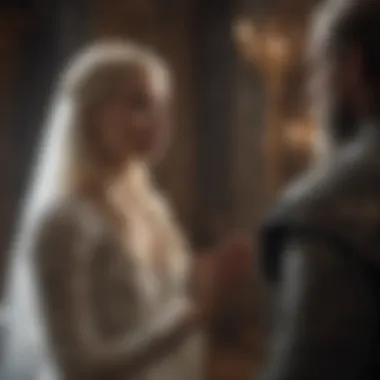
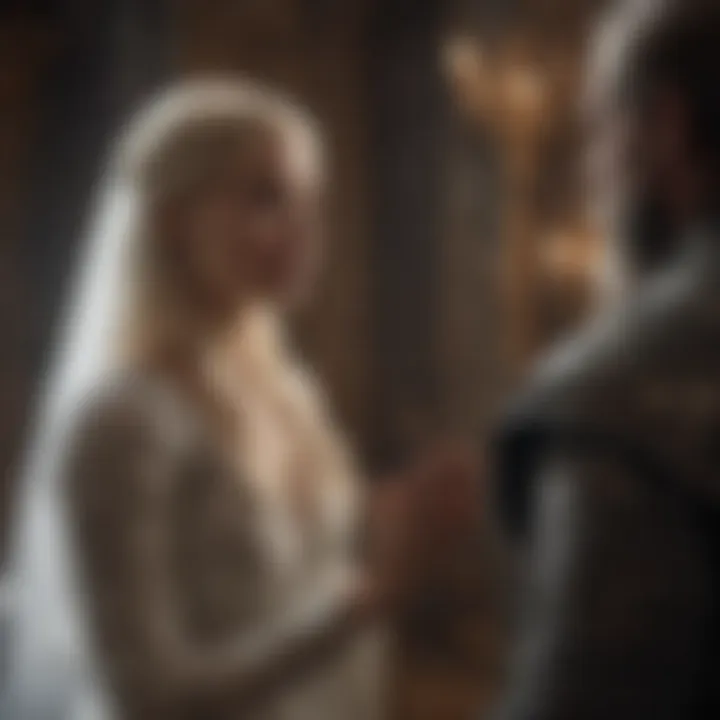
Robb Stark's marriage to Talisa Maegyr is another significant secret wedding that reshapes allegiances in Game of Thrones. Unlike his arranged marriage to one of House Frey’s daughters, Robb’s union with Talisa is born out of love and personal free will. However, this very love leads to dire consequences.
The choice to marry Talisa, without the consent of his mother or the Frey alliance, reveals a rebellious spirit against tradition. While Robb finds genuine companionship in Talisa, it proves challenging in the context of ongoing wars and blood feuds. Their secret wedding escalates tensions with House Frey, which ultimately leads to devastating ramifications during the infamous Red Wedding.
Secret Marriage of Rhaegar Targaryen and Lyanna Stark
The marriage between Rhaegar Targaryen and Lyanna Stark represents the most clandestine and consequential wedding in Game of Thrones. Their union, despite being shrouded in secrecy, has far-reaching implications for the realm. Rhaegar's abduction of Lyanna leads to the eruption of Robert's Rebellion. However, the truth of their marriage remains obscured for decades.
The secrecy surrounding this union reveals the complexities of love, duty, and betrayal. Rhaegar’s actions reflect a desperation to change the fate of his lineage and secure a future for his children outside the constraints imposed by the ruling powers of the time. Lyanna’s role in this narrative shifts the perception of her as a damsel into one of agency and power.
Character Motivations Behind Secret Weddings
Secret weddings in Game of Thrones are more than just clandestine ceremonies; they are reflections of the characters' desires, ambitions, and the worlds they inhabit. The motivations behind these unions play a vital role in understanding the narrative and character arcs within the story.
Desire for Autonomy
Characters often pursue secret weddings as a way to assert control over their personal lives. In a society governed by rigid structures and familial obligations, the act of marrying in secret can symbolize a yearning for independence. For instance, Lyanna Stark chooses to marry Rhaegar Targaryen outside of public scrutiny largely as a means to escape the expectations associated with her betrothal to Robert Baratheon. This secret act becomes a pivotal moment in the story, shaping not only her fate but also that of Westeros.
Moreover, this desire for autonomy is prevalent across various characters. Individuals like Robb Stark and Talisa Maegyr illustrate how secret weddings can serve personal desires over political alliances. Their union, devoid of formal approval, highlights the struggle of characters to find their path amidst societal constraints.
Political Ramifications
Secret weddings also bear heavy political implications in the Game of Thrones universe. These unions often arise from carefully calculated strategies intended to navigate the treacherous political landscape of Westeros. The clandestine nature of these marriages can create significant rifts and, in some cases, fuel conflicts.
For instance, the secret marriage of Rhaegar and Lyanna not only elicits profound political consequences, but it also alters the very fabric of power dynamics in the realm. By marrying Lyanna, Rhaegar challenges existing alliances, particularly with the Baratheons and the Starks, leading to catastrophic events such as Robert's Rebellion. Thus, while secret weddings are often portrayed as personal choices, they are often laden with intricate political motivations.
Cultural Tensions and Stigma
Within the realm of Westeros, cultural tensions and societal stigma significantly influence the decision to engage in secret marriages. The rigid structures of nobility and the expectations placed upon them create an environment where deviation from norms can result in ostracism or conflict.
For example, characters like Jon Snow face immense stigma surrounding their lineage, driving them towards secrecy in their romance. His relationship with Daenerys Targaryen, built on complicated familial ties, is marred by the potential backlash from the houses involved. The secrecy surrounding their union stems from the fear of cultural repercussions, illustrating how societal views on love and loyalty can deeply affect personal decisions.
"The need for autonomy within the confines of societal norms often creates a breeding ground for secrecy in personal relationships."
In summary, the motivations behind secret weddings are multi-faceted, representing the complexities of desire for autonomy, navigating political landscapes, and the need to confront cultural tensions. Understanding these motivations not only enriches our grasp of individual character arcs but also reveals the intricate interplay of personal desires and societal expectations in the Game of Thrones narrative.
Consequences of Secret Unions
Understanding the consequences of secret unions in Game of Thrones is crucial as it demonstrates the weight of personal decisions against the backdrop of societal norms. Secret weddings lead to a series of outcomes that ripple through family structures and political landscapes. They often challenge traditional roles and expectations, manifesting deep-seated impacts that shape character arcs.
Impact on Family Dynamics
Secret marriages can upend family relationships in profound ways. For instance, when Ned Stark married Catelyn Tully, it was a union rooted in love yet marked by political undertones. The secrecy surrounding his connection to Lyanna Stark not only colored his relationship with his wife but also created a shadow over his family reputation. This tension reflects how private actions can affect family dynamics, creating distrust or loyalty issues.
Moreover, Robb Stark's clandestine marriage to Talisa Maegyr illustrates the dangers of personal choices in a politically charged environment. By choosing love over duty, Robb alienated his allies, particularly the Freys. This act affected not only his immediate family but also the broader Stark legacy. HIs choices had ramifications for the North, altering alliances and exacerbating tensions with powerful factions.
The emotional strain of secret weddings often leads to conflict. Family members may struggle to accept the union when it contradicts their values or ambitions, which may lead to estrangement. The fallout becomes apparent as secrets unravel, creating rifts that can sometimes become irreparable. The implications of these secret unions universally resonate, echoing through generations in Westeros.
Political Alliances and Betrayals
The political backdrop of Game of Thrones is rife with tensions caused by secret unions. These marriages frequently redefine alliances or spark betrayals between houses. Rhaegar Targaryen's secret marriage to Lyanna Stark serves as a pivotal example. While their union was born of love, it had catastrophic political consequences. The birth of Jon Snow, the product of their union, turned the tides in the war of the Five Kings, complicating loyalties and raising questions about legitimacy.
The clandestine nature of these marriages often leads to a web of deception. Characters take risks to protect their interests, leading to pivotal betrayals. In the case of Robb Stark, his marriage broke the arranged alliance with House Frey, fueling animosity that eventually leads to the infamous Red Wedding. This event underscores how a personal choice can have expansive political fallout, deeply entwining personal relationships with political survival in the stark world of Westeros.
In sum, the consequences of secret unions within Game of Thrones reach far beyond individual characters. The impact on family dynamics can alter loyalties, and the political ramifications can shift the balance of power. By examining these elements, it becomes evident that even the most private decisions can lead to monumental changes in the realm.
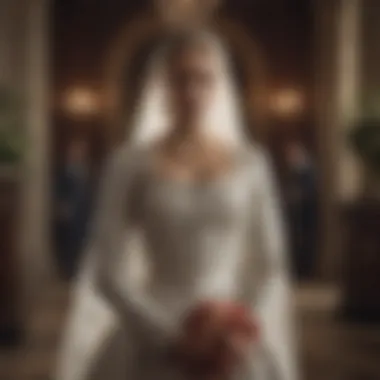
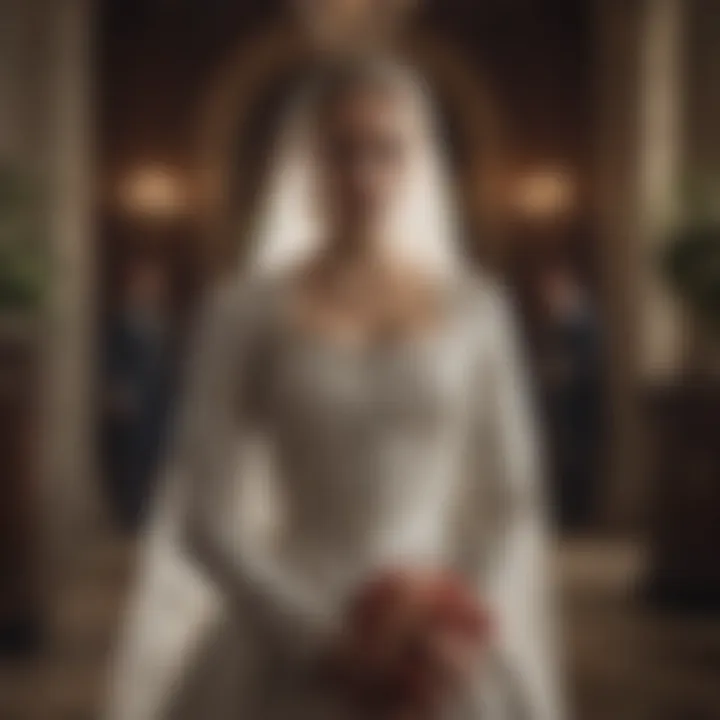
Secret Weddings and Their Thematic Implications
Secret weddings in the Game of Thrones universe embody several thematic implications that intertwine with the larger narrative. These clandestine unions often serve as a mirror reflecting the complexities of power, control, love, and loyalty. The significance of examining these events lies in understanding how they influence character actions and broader sociopolitical dynamics within Westeros.
Power and Control
In the world of Game of Thrones, marriage is not merely a romantic endeavor; it is a strategic tool used for gaining power and control. Secret weddings are often executed in response to circumstances that render traditional unions impractical or unsafe. For instance, the marriage of Rhaegar Targaryen and Lyanna Stark illustrates how the pursuit of love can conflict with the oppressive structures of society.
The implications of power dynamics are profound. Secret unions often arise from an individual's desire to navigate the rigid feudal systems and familial obligations thrust upon them. These weddings highlight unmet desires for agency in life’s choices. Often, those involved in secret marriages stand in stark opposition to the dominant powers dictating their lives, pushing against societal constraints.
"In Westeros, love is often a luxury, overshadowed by ambition and duty. Secret weddings challenge the status quo, seeking autonomy amid chaos." - Game of Thrones Scholar
Moreover, the secrecy surrounding these unions often serves as a protective measure, shielding the couple from potentially harmful retributions. Characters like Jon Snow and Daenerys Targaryen have faced their own dilemmas regarding love and duty, reinforcing the idea that power can be both a protector and a captor.
The Nature of Love and Loyalty
Love in Game of Thrones is rarely straightforward, especially when fused with the complications of secrecy. Secret weddings illuminate the multifaceted nature of love and loyalty, showcasing how personal feelings can conflict with public duties. The love between Ned Stark and Catelyn Tully, while not initially a secret, later became emblematic of loyalty towards family and the consequences of honor-bound choices.
Contrastingly, the intense romance between Robb Stark and Talisa Maegyr reveals the stark realities of betrayal in love, where personal emotions lead to political fallout. The furor that ensues from their secret marriage dramatically alters allegiances and impacts the Stark family’s standing.
In essence, the examination of these secret unions encapsulates how love is influenced by the surrounding turmoil and individual motivations. The struggle between personal loyalty and societal pressures never dissipates.
As such, these unions resonate with the audience's understanding of authenticity and the sacrifices made in the name of love. The themes of sacrifice, devotion, and the pain of hidden desires all come to the forefront, paving the way for deeper emotional engagement for viewers and readers alike.
In summary, secret weddings in Game of Thrones serve as crucial elements in the exploration of power dynamics and the complexities of love, portraying a tapestry of human experience that resonates on both personal and political levels.
Real-World Parallels of Secret Weddings
The concept of secret weddings within the realm of Game of Thrones resonates far beyond its fictional boundaries. This narrative device mirrors real-world scenarios where secrecy plays a vital role in relationships. By examining these parallels, one can better appreciate the nuances and motivations behind clandestine unions.
Cultural Contexts of Secret Marriages
Cultural factors significantly influence the prevalence of secret marriages. Various societies have historical examples where individuals sought covert unions to elude legal, social, or familial constraints. For instance, in certain cultures, marrying without parental consent may lead to disownment, prompting couples to wed discreetly.
In other contexts, such as wartime or under oppressive regimes, couples often resort to secret marriages to protect their union from external threats. These parallels highlight a universal theme: seeking autonomy in love.
- Religious considerations: In many cultures, religious prohibitions often obstruct relationships, leading couples to marry in secrecy, away from prying eyes.
- Gender dynamics: Secret weddings may often stem from gender inequalities, where women must navigate societal expectations while pursuing personal happiness.
Cultural attitudes about marriage continue to shift. In today’s globalized society, mixed-culture marriages demonstrate the ongoing relevance of secrecy in love, as couples sidestep traditional barriers.
Modern Perspectives on Secrecy in Relationships
In contemporary society, the notion of secrecy in relationships can evoke mixed reactions. The element of discretion can be seen as a protective measure or an indication of unhealthy dynamics. Many individuals today pursue private unions, motivated by a desire for intimacy that avoids external scrutiny.
- Digital privacy: As social media proliferates, couples often choose to keep their relationships private from the public gaze. The fear of online judgment plays a significant role in discreet unions now.
- Personal autonomy: Many modern partnerships prioritize individual choice, overriding traditional expectations imposed by family or society. This aligns with the yearning for self-determination, similar to the characters in Game of Thrones.
"Secrecy in love, whether in fiction or reality, often reflects deeper struggles between desire and societal obligations."
In summary, analyzing real-world parallels of secret weddings enriches the understanding of their functions within the Game of Thrones narrative. Hidden alliances and discreet unions reveal a complex interplay between personal desire and societal norms that exist both in Westeros and beyond.
Finale and Reflections
The exploration of secret weddings in Game of Thrones provides a lens through which we can examine the personal desires and societal constraints within the context of Westeros. This analysis underscores the complexity of relationships in a politically charged environment. Secret weddings are not merely plot devices; they represent deeper themes of power, autonomy, and the inherent struggle against societal expectations.
The Enduring Appeal of Secret Weddings in Fiction
Secret weddings in fiction resonate with audiences for various reasons. They present a captivating narrative of love that defies boundaries, pledging loyalty even in the face of adversity. In Game of Thrones, these unions often occur against a backdrop of conflict, leading to dramatic consequences. The allure lies in how these clandestine ceremonies elevate relationships into acts of rebellion.
The resonance with readers comes from the emotional stakes involved. Characters like Rhaegar Targaryen and Lyanna Stark capture imaginations because their love story exists outside the realm of societal norms. Ultimately, such weddings highlight the profound impact of personal choices within a structured society, inviting reflections on our own views about love and commitment.
Final Thoughts on the Future of Marriage in Westeros
Looking toward the future, the concept of marriage in Westeros remains fraught with tension. The legacy of secret weddings raises questions about traditional alliances and their consequences. As the narrative evolves, new characters will likely navigate old themes of loyalty and deception when forming unions.



